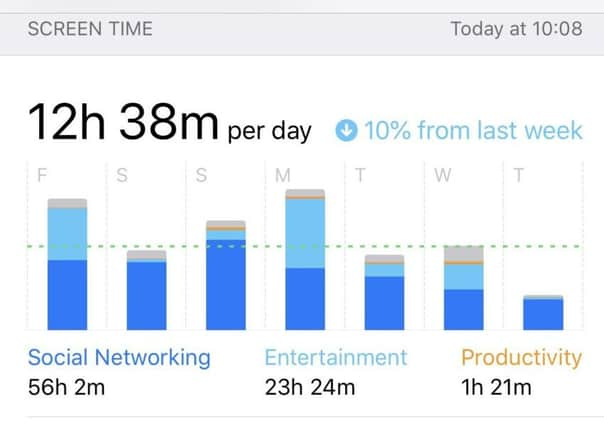Falkirk pupils found to spend ‘excessive’ time on phones and social media


Like it or loathe it, online communication is here to stay and has brought with it new ways for individuals, particularly young people, to connect.
Meeting up with friends after school has been substituted for Messenger chats, FaceTime calls, or online gaming sessions. Snapchat ‘streaks’ and Instagram ‘likes’ are important means of validation to young people and most teens prefer Youtube to TV these days.
Advertisement
Hide AdAdvertisement
Hide AdBut how much social media use is too much for youngsters who are trying to balance their social activity with their educational learning? And can spending lengthy periods online actually have a negative impact on their mental health?


Teachers at St Mungo’s High School in Falkirk believe it most definitely can and, in a bid to tackle the problem head on, have organised various events aimed at educating both pupils and parents on this subject as well as other important issues affecting young people in today’s modern world.
The school are also promoting positive mental health among pupils as part of its three-year Heads Up mental health strategy.
Pastoral Head Joanne Cleland said: “Early intervention is key. We want to reach out to pupils and educate them about positive steps they can take to look after their mental health before they reach crisis point.
“We are also keen to work with parents to help them understand some of the mental health problems pupils are facing today, many of which are linked to excessive social media and mobile phone usage – it’s a huge issue.”
Mrs Cleland said she had noticed a clear link in recent times with pupils feeling down and spending long periods online.
One fourth year pupil confided that she spent 87 hours on her phone in just one week, which, when broken down, equated to 12.5 hours per day.
“Forty-two hours were spent using Snapchat alone,” Mrs Cleland said. “It’s a shocking figure but the girl involved didn’t seem to think so or even see it was an issue.
Advertisement
Hide AdAdvertisement
Hide Ad“For her it was just the norm which is extremely worrying and, after speaking to other pupils, it’s clear this is more of a widespread problem.”
A school survey found that most students used their phones on average between six and seven hours per day with the majority of that time spent on social media.
One pupil admitted she had used her device for a staggering 19 hours in one day.
Mrs Cleland said: “When questioned she said it was because she watches Netflix to help her sleep every night.”
Mrs Cleland said she had noticed a “definite increase” recently in pupils reporting feelings of stress and anxiety.
“When a pupil comes to me to say they are stressed the first thing I say is let’s look at your phone and we go through the amount of time they spend on their devices and on social media and talk about how they could better spend their time by going out with friends or studying.”
Mrs Cleland said phones are allowed in class for learning purposes only but if pupils have notifications switched on they can still be distracted.
The school has close links with mental health agencies such as FDAMH and CAMHS but referral times can sometimes be lengthy.
Advertisement
Hide AdAdvertisement
Hide Ad“That’s why, as a school, we felt we wanted to do something ourselves to promote positive mental health,” she explained.
Thirty-three members of staff at St Mungo’s recently completed an online course about young people’s mental health.
The school has also been selected as a pilot school for the Mental Health Foundation’s Peer Education Project and Stress Less programme.
A wide range of activities have been arranged for pupils as part of Mental Health Awareness Week which runs from May 13 to 19 and also as part of the school’s Heads Up strategy including meditation, prayer, nature walks, mindfulness, music, pet therapy and sleep workshops led by experts from Strathclyde University’s Sleep Research Unit.
Pastoral teacher Jacqueline Pollock said: “One of the aspects we are focusing on is self-care and activities that promote good mental health and resilience. The theme this year is body image which we will be promoting during form time.
“The staff who completed the 40-hour distance learning course entitled Understanding Children and Young People’s Mental Health are identified to pupils by their ‘Heads Up’ lanyards and Mental Health Foundation Badges.”
Senior pupils have also completed Scotland’s Mental Health First Aid course.